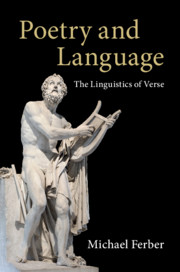Book contents
- Poetry and Language
- Poetry and Language
- Copyright page
- Dedication
- Contents
- Illustrations
- Acknowledgments
- Chapter One Introduction
- Chapter Two Meter and the Syllable
- Chapter Three Rhyme
- Chapter Four Onomatopoeia and Sound Symbolism
- Chapter Five Unusual Word Order and Other Syntactic Quirks in Poetry
- Chapter Six The Meaning of a Poem
- Chapter Seven Metaphor
- Chapter Eight Translating Poetry
- Appendix Quantity and Pitch in Greek Verse
- Works Cited
- Index
Chapter Three - Rhyme
Published online by Cambridge University Press: 02 October 2019
- Poetry and Language
- Poetry and Language
- Copyright page
- Dedication
- Contents
- Illustrations
- Acknowledgments
- Chapter One Introduction
- Chapter Two Meter and the Syllable
- Chapter Three Rhyme
- Chapter Four Onomatopoeia and Sound Symbolism
- Chapter Five Unusual Word Order and Other Syntactic Quirks in Poetry
- Chapter Six The Meaning of a Poem
- Chapter Seven Metaphor
- Chapter Eight Translating Poetry
- Appendix Quantity and Pitch in Greek Verse
- Works Cited
- Index
Summary
The most common meaning of “rhyme” is the sameness or identity of sound between two words at the end of lines of verse, an identity that includes a stressed vowel and whatever follows it, if anything: a consonant or two, another syllable or two (if unstressed), even another (unstressed) word. So, in a million poems and songs, “moon” and “June” are united by rhyme, or “love” and “dove.” Bisyllabic rhymes are stressed on the second-last syllable, as in “marriage” and “carriage,” or “spoken” and “awoken.” Trisyllabic rhymes are stressed on the third-last syllable, such as “history” and “mystery”; they are often deployed for comic purposes, such as when Byron rhymes “gunnery” with “nunnery,” or “goddesses” with “bodices” (Don Juan 1.38, 41). Tetrasyllabic rhymes show up in Ogden Nash’s poems, for example, when he pairs “antidisestablishmentarianism” with “antiquarianism” (“No, You Be a Lone Eagle”).
- Type
- Chapter
- Information
- Poetry and LanguageThe Linguistics of Verse, pp. 58 - 85Publisher: Cambridge University PressPrint publication year: 2019



